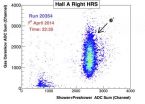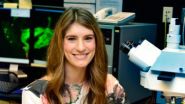(Press-News.org) DALLAS – April 14, 2014 – Popular web information on colorectal cancer is too difficult for most lay people to read and doesn't address the appropriate risks to and concerns of patients, a study by UT Southwestern Medical Center gastroenterologists suggests.
In a review of a dozen popular websites, most of the online patient education materials for colorectal cancer screening were written beyond the recommended sixth-grade reading level, while content on the sites failed to address key risks, as well as the barriers to and benefits of screening, according to the study's authors Dr. Deepak Agrawal, Assistant Professor of Internal Medicine, and Dr. Chenlu Tian, an Internal Medicine fellow.
"Today, the Internet often is the first point of contact between the patient and health-related information, even for patients with low literacy. In, thus, is a great opportunity for us to influence the decisions people make about their health and to steer them in the right direction. Informing patients is a physician's responsibility and we take this role seriously," said Dr. Agrawal, senior author and gastroenterologist in the division of Digestive and Liver Diseases at UT Southwestern.
The study, which appears in the journal Gastrointestinal Endoscopy and was conducted along with researchers from UT Arlington, is the first to analyze the appropriateness of internet-based materials in terms of health literacy.
Colorectal cancer remains the second leading cause of cancer death in the United States, despite effective screening tests, including the fecal occult blood test (FOBT), flexible sigmoidoscopy, and colonoscopy. Developing more appropriate and targeted patient education resources on colorectal cancer may improve patient understanding and promote screening, an important goal because U.S. colorectal cancer screening rates remain below target levels, the authors said.
The "Healthy People 2010" initiative proposed a colon cancer screening rate of at least 70.5 percent. Colon cancer screening rates remain under 50 percent for those with less than high school reading levels, well below the overall average of about 65 percent, according to the study.
Previous studies have shown that six of 10 people rely on the Internet when seeking information about colonoscopy screening. Yet, readability for 10 of the 12 sites reviewed – all from reputable medical societies and considered likely referral sites for physicians – surpassed the maximum recommended sixth-grade reading level.
In addition to being too hard to read, the researchers found, the sites failed to address key concerns, such as the risk of getting colon cancer, the chances of dying from colon cancer, and how easy would it be to get screening. The review found that only half of the sites discussed colorectal cancer risk in the general population and only a quarter specifically addressed patients at high risk, such as African Americans, smokers, patients with diabetes, and obese patients.
The sites also failed to adequately address other common barriers to screening. For example, less than 10 percent of the sites addressed embarrassment, a common concern, and only a quarter addressed pain associated with colonoscopy or the costs of the procedure. None specifically mentioned the need for colonoscopy when no symptoms are present.
"It is important to add that reading information on a website should not be considered a substitute for consulting a physician," Dr. Agrawal said.
"Internet information is best used as a supplement. With colon cancer screening, there are many options and each has its risks and benefits. An actual discussion with a physician would help patients choose the best option."
Sites reviewed for the study included those of the American Society for Gastrointestinal Endoscopy; American Gastroenterological Association; National Cancer Institute; Centers for Disease Control and Prevention; American College of Gastroenterology; American Society of Colon and Rectal Surgeons; Colon Cancer Alliance; and the American Cancer Society.
INFORMATION:
UT Southwestern's Harold C. Simmons Comprehensive Cancer Center is the only National Cancer Institute-designated cancer center in North Texas. The center brings innovative cancer care to the region, while fostering groundbreaking basic research that has the potential to improve patient care and prevention of cancer worldwide.
About UT Southwestern Medical Center
UT Southwestern, one of the premier academic medical centers in the nation, integrates pioneering biomedical research with exceptional clinical care and education. The institution's faculty includes many distinguished members, including five who have been awarded Nobel Prizes since 1985. Numbering more than 2,700, the faculty is responsible for groundbreaking medical advances and is committed to translating science-driven research quickly to new clinical treatments. UT Southwestern physicians provide medical care in 40 specialties to nearly 91,000 hospitalized patients and oversee more than 2 million outpatient visits a year.
Website information on colon cancer too complex, fails to address key concerns
2014-04-14
ELSE PRESS RELEASES FROM THIS DATE:
Beam on target!
2014-04-14
Late on April 1, the crown jewel of the Department of Energy's Thomas Jefferson National Accelerator Facility ("Jefferson Lab") sparkled its way into a new era. Following an upgrade of the Continuous Electron Beam Accelerator Facility, the CEBAF accelerator delivered the highest-energy electron beams it has ever produced into a target in an experimental hall, recording the first data of the 12 GeV era. The machine sent electrons around the racetrack three times (known as "3-pass" beam), resulting in 6.11 GeV electrons at 2 nanoAmps average current for more than an hour.
"This ...
NASA sees remnants of Tropical Depression Peipah over Southern Philippines
2014-04-14
Tropical Depression Peipah has been very stubborn and has moved over the southern and central Philippines bringing clouds, showers and gusty winds. NASA-NOAA's Suomi NPP satellite captured an image that showed Peipah's clouds covering the Visayas and Mindanao regions of the country.
The VIIRS instrument aboard NASA-NOAA's Suomi NPP satellite captured a visible look at the remnant clouds associated with former Tropical Depression Peipah on April 14 at 4:24 UTC/12:24 a.m. EDT. The Visible Infrared Imaging Radiometer Suite (VIIRS) instrument collects visible and infrared ...
Pharmacists can significantly improve blood pressure, cholesterol in stroke patients
2014-04-14
Stroke patients managed by a pharmacist had a 12.5% improvement in blood pressure and low-density lipoprotein (LDL), or "bad" cholesterol levels compared with a control group, according to a clinical trial published in CMAJ (Canadian Medical Association Journal).
Patients who have a stroke or "mini stroke" (transient ischemic attack) are at high risk of adverse cardiovascular events. Management of high blood pressure and cholesterol after a stroke is important because it can substantially reduce the risk of a negative event; however, many patients receive suboptimal care. ...
'MicroRNA' could be key target for bowel cancer treatment
2014-04-14
Scientists found that the molecule, called microRNA 135b, is a vital 'worker' employed by several important cancer genes to drive the growth of bowel cancers.
Drugs targeted at the microRNA could knock out the effects of multiple cancer-causing mutations at once, while tests for it could identify patients with the most aggressive disease, the researchers believe.
The research was carried out by an international team including scientists based at The Institute of Cancer Research, London, the University of Glasgow and Ohio State University in the US.
Scientists tested ...
Study identifies a likely key driver of colorectal cancer development and progression
2014-04-14
COLUMBUS, Ohio – A new study identifies a molecule that is a probable driving force in colorectal cancer and suggests that the molecule could be an important target for colorectal cancer treatment and a valuable biomarker of tumor progression.
The study of microRNA-135b (miR-135b) in two animal models and human tumors was published in the journal Cancer Cell and was led by researchers at The Ohio State University Comprehensive Cancer Center – Arthur G. James Cancer Hospital and Richard J. Solove Research Institute (OSUCCC – James) and at the University of Glasgow in ...
Dietary supplement use among US adults more prevalent than previously thought
2014-04-14
Washington, D.C., April 14, 2014—Dietary supplement use by U.S. adults is more prevalent than indicated by published data from the National Health and Nutrition Examination Surveys (NHANES), according to a new article in the peer-reviewed Journal of the American College of Nutrition (JACN). The review article is based on five consecutive years of online market research studies, conducted by Ipsos Public Affairs for the Council for Responsible Nutrition (CRN).
According to Annette Dickinson, Ph.D., corresponding author and a consultant for CRN, "This new review adds to ...
Young dads at high risk of depression, too
2014-04-14
CHICAGO --- Depression can hit young fathers hard -- with symptoms increasing dramatically during some of the most important years of their children's lives, a new Northwestern Medicine® study has found.
Depressive symptoms increased on average by 68 percent over the first five years of fatherhood for these young men, who were around 25 years old when they became fathers and whom lived in the same home as their children. The results of the study were published April 14 in the journal Pediatrics.
This study is the first to identify when young fathers are at increased ...
Osteoporosis drugs appear to impede cell membrane repair
2014-04-14
AUGUSTA, Ga. –A class of drugs widely used to treat osteoporosis appears to impede a cell's ability to repair a protective outer membrane that helps determine what enters and exits, researchers report.
The inability to quickly repair a membrane is lethal to a cell and may help explain the rare and serious side effect of jawbone destruction that can occur following dental work in patients taking these drugs, said Caroline Lewis, a sophomore at the Medical College of Georgia at Georgia Regents University.
"The bottom line is it inhibits cell membrane repair in two distinct ...
Long-term antibiotic treatment for Q fever causes weight gain
2014-04-14
Scientists have unearthed still more evidence that antibiotics can contribute to obesity. Research published ahead of print in the journal Antimicrobial Agents and Chemotherapy suggests that patients on long-term antibiotic treatment gained weight and had significant changes in their gut microbiota.
The study, led by Didier Raoult, of Aix-Marseille University, Marseille, France, followed 48 patients who were being treated long-term with doxycycline and hydroxychloroquine for Q fever, and 34 control subjects. Nearly one quarter of the treated patients gained anywhere ...
Shiny quantum dots brighten future of solar cells
2014-04-14
A house window that doubles as a solar panel could be on the horizon, thanks to recent quantum-dot work by Los Alamos National Laboratory researchers in collaboration with scientists from University of Milano-Bicocca (UNIMIB), Italy. Their project demonstrates that superior light-emitting properties of quantum dots can be applied in solar energy by helping more efficiently harvest sunlight.
"The key accomplishment is the demonstration of large-area luminescent solar concentrators that use a new generation of specially engineered quantum dots," said lead researcher Victor ...




